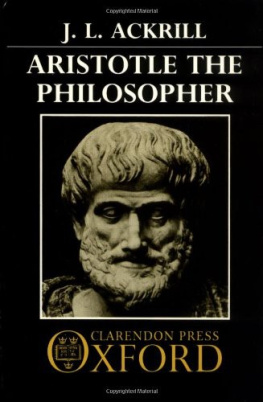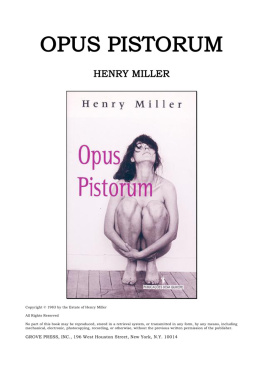Opus Dei in the Church
A THEOLOGICAL REFLECTION ON THE SPIRIT AND APOSTOLATEOF OPUS DEI
Pedro Rodriguez, Fernando Ocariz and JoseLuis Illanes
With a foreword byBISHOPALVARO DEL PORTILLO

This is a translation ofEl Opus Dei en la Iglesia Pedro Rodriguez, Fernando Ocariz y Jose LuisIllanes 1993 and Ediciones Rialp, S.A. 1993
English edition 1994: FourCourts Press First printed 1994; reissued 1995
ISBN 1-85182-149-x (FourCourts Press edition) ISBN 1-85182-168-6 pbk
ISBN 0-933932-723 (ScepterPublishers edition) ISBN 0-933932-79-0 pbk
CONTENTS
FOREWORD
BISHOP ALVARO DEL PORTILLO
In preparing to write a short foreword for thisbook I thought immediately of the love Blessed Josemara Escriv had for theChurch. For, if it is true that to understand Opus Dei one needs to study itsfounder, that applies even more when one intends to examine that aspect of OpusDei which is the subject of this volume.
Anyone who knew BlessedJosemara even slightly can attest to his enthusiasm whenever he spoke aboutthe Spouse of Christ, and the intensity with which he embraced wholeheartedlyanything which in one way or another had to do with the Church. In the fortyyears I lived by his side, I was a daily witness to the fact that our HolyMother the Church was one of his great loves. The Church was the family towhich he belonged and he heroically dedicated himself to its service.
In 1918, while still anadolescent, he first experienced intimations of love for God, a love which grewfrom that moment on. He decided to become a priest so as to be more availableto carry out God's plans. Over the years, on more than one occasion, whenreferring to himself he said that his sole, ardent desire was to be "apriest of Jesus Christ". That priest, on 2 October 1928, felt himselfcalled by God to found Opus Dei. From that moment on, with the grace of theHoly Spirit, he devoted himself entirely to that institution, motivated by thelove for Christ and for the Church that filled his heart.
The holy zeal of Blessed Josemaraon behalf of Christ's Church showed itself constantly in his words and deeds,at times in an especially marked and dramatic manner. One example of this wasan event that occurred in 1933. He was praying in a Madrid church, and duringhis fervent conversation with our Lord, he began to experience great anxiety.He began to imagine that all his efforts to found and develop Opus Dei might bemisguided; that perhaps he had been misled, and might mislead others. Hereacted by making a humble act of faith, and told God, "Lord, if Opus Deiis not here to serve the Church, destroy it!" The reasoning behind hisreaction is evident: the Church was all he lived for. His thoughts and actionsreflected his conviction that the Church was the Body of ChristChrist himselfpresent in the souls of the faithful, as he liked to see it.
Among the published homiliesof Opus Dei's founder, there is one which he delivered on the campus of theUniversity of Navarre"Passionately Loving the World". I remembervery well that it was Blessed Josemara himself who chose the title when theItalian edition of the homily was published. He really did have a greatcapacity for love, and he cherished all that was noble, wholesome and beautifulin this world. This honourable passion of his had very deep roots. His love forand dedication to Jesus Christ and his Church led him to see in the world, insociety and in any noble human endeavour, a reflection of God's love formankind and our capacity to respond to our Creator's affection by sanctifyingour work. Blessed Josemara's passionate love for the world was simply anextension of his love for Christ and the Church. One can say that he took toheart what St Augustine once declared: Ecclesia, hoc est mundusreconciliatus. Love for the world and for the Church did not constitute twoseparate things in the mind and heart of the founder of Opus Dei.
This theological view ofhistory led him to see Christians as men and women, as children of God, whoserightful place it is to be in the very heart of civil society in order to bringthe world back to its Creator, thereby contributing to the work of Redemptionin and through their ordinary human occupations. It was this acute awareness ofthe transcendent destiny of man which led the founder of Opus Dei, in hisactions and through his preaching, to stress the great value of all earthlyrealities, even those which seem ordinary and unimportant. He always saw theChurch not only as an institution or structure, but also as the People of God,the sum total of all Christians. He saw the Church in the heart of each one ofJesus' disciples, to the point where he asserted, with a deep conviction, that"the Church is present wherever there is a Christian who strives to livein the name of Christ". This Church, which is both institution andcharism, structure and life, hierarchy and fraternity, is the same Church whichMonsignor Escriv de Balaguer loved with all his heart, without any limits orreservations. That is why I feel I can say quite confidently, glossing thetitle of that homily, that he spent his life "passionately loving theChurch".
It was in that Churchto which Blessed Josemara devoted his life that Opus Dei was born. This bookis a study of the prelature and its place in the Church. "AnEcclesiological Study of the Life and Apostolate of Opus Dei", as thesubtitle says. The authors have produced a profound and insightful study on thenature of Opus Dei as a personal prelature within the structure of the Church,on vocation to Opus Dei as a specific manifestation of baptismal vocation, andon secularity as the proper condition of ordinary Christians and therefore ofthe faithful of the prelature.
Throughout these pages, onecan see that the authors have understood and expounded the ecclesiality of OpusDei using two principal sources the writings of its founder and the livingreality of the prelature. Naturally, before it became the object of theologicalstudy, that ecclesiality was lived out in the priesthood of Blessed JosemaraEscriv de Balaguer, and in the apostolates of Opus Dei. I frequently heard thefounder speak about a criterion for interpreting the history of the Churchwhich he found verified in the very institution which God had inspired him tofound. "First," he would say, "comes life, the living pastoralphenomenon. Next comes the juridical norm, usually derived from custom.Finally, the theological theory which is developed from the livingreality." This approach has allowed the authors to emphasize how thefounding of Opus Dei and its historical development can only be understood asan expression of the living reality of the Church, which is the source andtouchstone of everything Christian. Precisely because of this, in writing theforeword to this book, I have tried to set it in the framework of BlessedJosemara's contemplation of the mystery of the Church. That contemplation, andthe love which it involves, underlies the reality of Opus Dei and explains itsapostolic activity, that is, the specific pastoral task for which the Popeestablished this ecclesiastical circumscription, the prelature, some ten yearsago.
+Alvaro del Portillo
Prelate of Opus Dei
Rome, 9 January 1993
PREFACE
Ten years ago today, on 28 November 1982, PopeJohn Paul II signed the Apostolic Constitution Ut sit, establishing OpusDei as a personal prelature. This was a decisive event in the process wherebyOpus Dei assumed the canonical structure suited to its theological andspiritual reality. A few months later, on 19 March 1983, the oral promulgationof the Constitution took place in a ceremony during which Archbishop RomoloCarboni, papal nuncio to Italy, solemnly presented the papal bull to theprelate of Opus Dei.


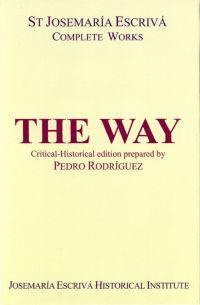
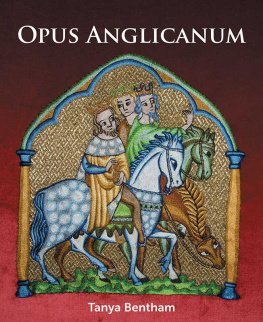
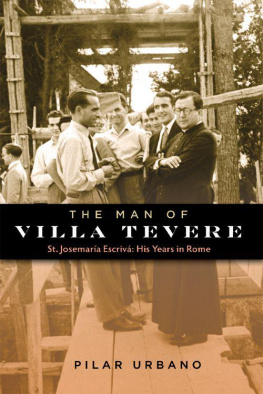
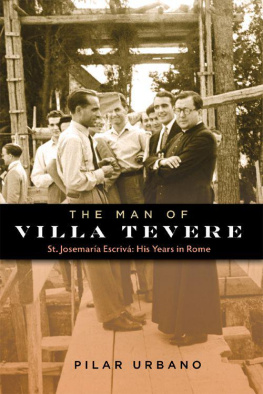
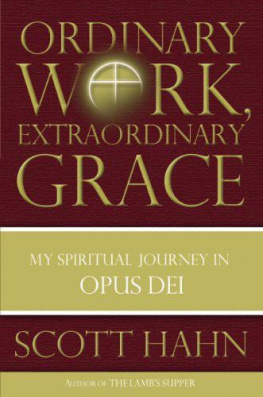
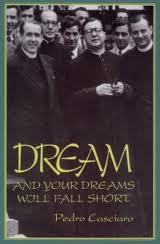



![Scott Hahn [Inconnu(e)] - Ordinary Work, Extraordinary Grace: My Spiritual Journey in Opus Dei](/uploads/posts/book/134758/thumbs/scott-hahn-inconnu-e-ordinary-work.jpg)
